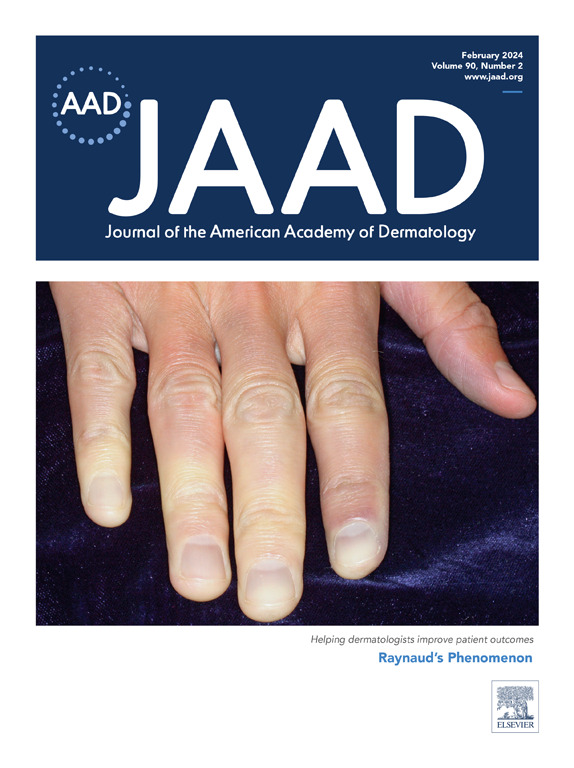Efficacy and safety of vunakizumab in moderate-to-severe chronic plaque psoriasis: A randomized, double-blind, placebo-controlled phase 3 trial
IF 12.8
1区 医学
Q1 DERMATOLOGY
引用次数: 0
Abstract
Background
Vunakizumab, a novel anti-interleukin-17A antibody, has shown promising efficacy for moderate-to-severe plaque psoriasis in a phase 2 trial.
Objective
We conducted a double-blind, randomized phase 3 trial (NCT04839016) to further evaluate vunakizumab in this population.
Methods
Six hundred ninety subjects were randomized (2:1) to receive vunakizumab 240 mg or placebo at weeks 0, 2, 4, and 8. At week 12, subjects on placebo were switched to vunakizumab 240 mg (weeks 12, 14, 16, and every 4 weeks thereafter). The co-primary endpoints were ≥90% improvement from baseline in the Psoriasis Area and Severity Index score (PASI 90) and a static Physicians Global Assessment score of 0/1 (sPGA 0/1) at week 12.
Results
At week 12, the vunakizumab group showed higher PASI 90 (76.8% vs 0.9%) and sPGA 0/1 (71.8% vs 0.4%) response rates, as well as higher PASI 75 (93.6% vs 4.0%), PASI 100 (36.6% vs 0.0%), and sPGA 0 (38.2% vs 0.0%) response rates (all two-sided P < .0001 vs placebo). Efficacy was maintained through week 52 with continuous vunakizumab. Possible treatment-related serious adverse events occurred in 0.9% of vunakizumab-treated subjects.
Limitations
Chinese subjects only; no active comparator.
Conclusion
Vunakizumab demonstrated robust clinical response at week 12 and through week 52, with good tolerability in moderate-to-severe plaque psoriasis.
武那单抗治疗中重度慢性斑块状银屑病的疗效和安全性:一项随机、双盲、安慰剂对照的 3 期试验。
背景:新型抗IL-17A抗体武那单抗(VunakizumabVunakizumab是一种新型抗IL-17A抗体,在一项2期试验中对中重度斑块状银屑病显示了良好的疗效:我们进行了一项双盲、随机3期试验(NCT04839016),以进一步评估vunakizumab在这一人群中的疗效。方法:690名受试者被随机(2:1)分配,在第0、2、4和8周接受vunakizumab 240毫克或安慰剂治疗。在第12周,服用安慰剂的受试者转为服用vunakizumab 240毫克(第12、14、16周,此后每4周一次)。共同主要终点是在第12周时,银屑病面积和严重程度指数评分(PASI 90)比基线改善≥90%,静态医生总体评估评分为0/1(sPGA 0/1):第12周时,武那单抗组的PASI 90(76.8% vs 0.9%)和sPGA 0/1(71.8% vs 0.4%)应答率较高,PASI 75(93.6% vs 4.0%)、PASI 100(36.6% vs 0.0%)和sPGA 0(38.2% vs 0.0%)应答率也较高(均为双侧):结论:结论:在第12周和第52周,武那单抗在中重度斑块状银屑病患者中表现出稳健的临床反应和良好的耐受性。
本文章由计算机程序翻译,如有差异,请以英文原文为准。
求助全文
约1分钟内获得全文
求助全文
来源期刊
CiteScore
8.60
自引率
5.80%
发文量
2023
审稿时长
49 days
期刊介绍:
The Journal of the American Academy of Dermatology (JAAD) is the official scientific publication of the American Academy of Dermatology (AAD). Its primary goal is to cater to the educational requirements of the dermatology community. Being the top journal in the field, JAAD publishes original articles that have undergone peer review. These articles primarily focus on clinical, investigative, and population-based studies related to dermatology. Another key area of emphasis is research on healthcare delivery and quality of care. JAAD also highlights high-quality, cost-effective, and innovative treatments within the field. In addition to this, the journal covers new diagnostic techniques and various other topics relevant to the prevention, diagnosis, and treatment of skin, hair, and nail disorders.

 求助内容:
求助内容: 应助结果提醒方式:
应助结果提醒方式:


